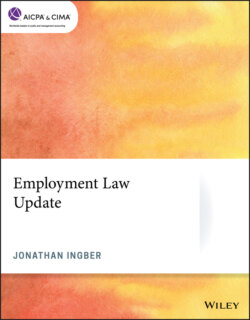Читать книгу Employment Law Update - Jonathan Ingber - Страница 7
Preliminary note
ОглавлениеIn September 2017, William J. Emanuel1 was confirmed as the newest member of the National Labor Relations Board (NLRB), marking the transition from Democratic to Republican majority control of the NLRB. President Trump has nominated Janet Dhillon to be chair of the Equal Employment Opportunity Commission (EEOC). In November 2017, Peter Robb was confirmed by the Senate as the NLRB's incoming general counsel following his nomination by President Trump.
Commentators have suggested that the majority-Republican-controlled NLRB may revisit the NLRB's effort to classify franchisors as co-employers with their franchisees (the McDonald's case). Several of former President Obama's executive orders have been rescinded, including:
Executive Order 13673 [Fair Pay and Safe Workplaces] on March 27, 2017
Executive Orders 13683 and 13738, both of which had amended Executive Order 13673
The Trump administration and the Republican-controlled Congress2 has sought to limit or reduce theEEOC's enforcement budget — consistent with the administration's “pro-business” approach — and the EEOC may seek to eliminate or revise pending EEOC rules. One such rule made major revisions to the Employer Information Report (Form EEO-1) by requiring employers to report wage information broken down by gender and race. That rule was scheduled to become effective in March 2018, and was approved by a “party-line” vote of the then-Democratic EEOC majority.
It also is possible that the new administration could at some point propose legislation to establish federal paid sick leave rights, as President Trump approvingly spoke of during the campaign. President Obama's Executive Order 13706 required up to seven days of paid sick leave for workers on federal contracts. The U.S. Department of Labor implemented the order through final regulations effective January 1, 2017, covering procurement contracts for construction under the Davis-Bacon Act, service contracts covered by the Service Contract Act, and contracts in connection with federal property or lands and related to offering services for federal employees, their dependents, or the general public.
Speaking in generalities, the newly constituted EEOC is expected to be more accommodating to employers in 2019 and the NLRB is predicted to exhibit a more business-friendly approach in 2019. No matter your politics, it is clear that labor policy and priorities in the new administration have and will differ materially from recent historical policies and priorities.
